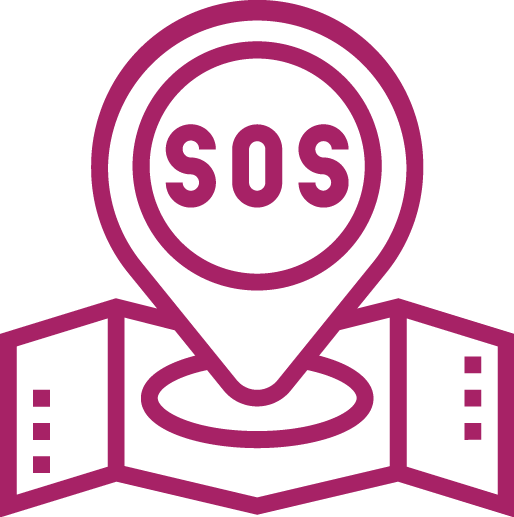Stay Safe: Managing Crises
Please be aware if you call 911, police are not trained to provide mental health support and may even pose a danger to Black, Indigenous, and People of Color, Transgender, Psychiatric disabilities, Neurodivergent, and Disabled People.
If calling 911, ask for someone who is trained in mental health crises.
Essential Steps to Take While Waiting for Help
-

Step 1
Grab emergency documents such as safety plan, advanced directives, medical identification, and emergency contact list.
-

Step 2
Stall! This can be a good way to buy you more time to diffuse the situation.
-

Step 3
Get your advocate(s) or support person(s)!
-

Step 4
Contact your lawyer.
-

Step 5
Know your rights!
Step 1
Grab these emergency documents:
✓ Safety Plan
Keep this within reach.
✓ Psychiatric Advanced Directive
Keep this within reach.
✓ Medical Identification
✓ Emergency Contact List
Keep this within reach.
Step 2
Stall!
This can be a good way to buy you more time to diffuse the situation, for example:
“I need to grab some water.”
“I need to get my medication/essential items.”
“Let me make a quick call to someone who can help.”
Step 3
Get your advocate(s) or support person(s)!
Reach out to your trusted community leader, family member, neighbor, or friend who can be present if you are calling the police or are with police.
Step 4
Contact your lawyer
Refrain from speaking with public defenders if you know you will have your own legal representation within 24-48 hours. You will need your lawyer for the magistrate/TDO hearing. Learn more →
Step 5
Know that you have a right to:
Bring a support person in almost every setting. Understand that there is a difference between:
Supports Person—someone that helps physically and emotionally assist the patient and ensure effective communication between the hospital staff and the patient
Personal Attendant/Caregiver—a health care professional who provides non medical assistance to individuals.
Remain silent if you wish—you have the right to be represented by your own attorney. If you don't have an attorney, one will be appointed to you.
Have a Temporary Detention Order (TDO) be reversed by a psychiatrist's assessment as soon as possible.
If you need Emergency Response help and have not yet called 911, call these emergency resources
LINES THAT DO NOT CALL POLICE:
📞 Wildflower Alliance Peer Support Line 1-888-407-4515
Trained peer supporters
📞 CALL BLACKLINE 1-800-604-5841
Centers BIPOC, LGBTQ+ Black Femme Lens
📞 Trans Lifeline 1-877-565-8860
Run by & for Trans people
English & Español
📞 StrongHearts Native Helpline 1-844-762-8483
24/7
Centers Native Americans & Alaska Natives
📞 Thrive Lifeline 1-313-662-8209
24/7
Trans-led and operated
📞 LGBT National Help Center 1-888-4564
the leading national organization providing crisis intervention and suicide prevention services to lesbian, gay, bisexual, transgender and questioning (LGBTQ)
For young people ages 13-24
📞 Trevor Project 212-695-8650
focused on suicide prevention efforts for lesbian, gay, bisexual, transgender, queer, and questioning youth, they offer a toll-free telephone number where confidential assistance is provided by trained counselors
LINES THAT DO CALL POLICE:
📞 Crisis Text Line 741741
📞 Call 988—988 Lifeline
If you need emotional support, reach out to the national mental health hotline: 988
📞 CR2 Crisis Response 703-527-4077
Phone call only: not going to deny services in crisis, but will provide connection to local CSB CIC or get you to a hospital.
Call for: aggression or self-harm, thoughts of suicide, threatening behaviors, hallucinations or delusional thinking, substance use, property destruction, extreme social isolation, loss of coping skills, dangerous decision making
Serves Counties of: Arlington, Fairfax, Prince William and Loudoun and
ServesCities of: Alexandria, Fairfax, Falls Church, Manassas and Manassas Park
📞 711
TTY-Based Telecommunications Relay Service
Important Documents and Definitions
Safety Plan
Who is on your care team? This could include caregivers, doctors, family members, and friends.
Some things to include in a safety plan are:
Identification of your Power of Attorney and/or Legal Guardian
Emergency contact list—this is a list of who to contact for support during a crisis (See Emergency Contact List section below)
A written statement of preferred care or treatment in case of emergency, identification of your Advanced Directives (See Advanced Directive section below)
Ways to make you feel calmer
Before a crisis, discuss your safety plan with your care team. Educate your care team on what your wants and needs are as well as what your triggers are.
If you need help developing your plan, contact ECNV for support!
Psychiatric Advanced Directive
A psychiatric advanced directive is a legal document that contains information about your desired medical care if you are unable to communicate your wishes. Parts of the document outline your end-of-life treatment preference and can tell a healthcare provider which medical treatments you do or do NOT want.
If you have prepared a psychiatric advanced directive, ensure it is accessible in case you need to bring it with you in an emergency.
Before a crisis, discuss your advanced directive with your care team/supports.
If you don’t have a psychiatric advanced directive, reach out to VALegalAid.COM.
Medical Identification
Consider which form of identification is best for you.
Medical ID Card—a card that contains your health information so that it's easily accessible in an emergency. It can include your allergies, medications, insurance information, and emergency contacts
Electronic Medical Identity Card: NFC—A person can "touch" the NFC logo on the back of the card with a compatible phone to access their medical information.
QR Code A unique QR code is linked to a person's medical profile. First responders can scan the QR code with a smartphone to access the person's medical information.
Medical ID Jewelry can be a good way to identify yourself and your needs without posing as a threat. A bracelet or necklace does not require reaching into your pocket, potentially appearing threatening to law enforcement like a medical card might. Please see the link below for more information on medical ID bracelets.
Emergency Contact List
Who to contact for support during a crisis or who can help diffuse the situation?
This can include family members, friends, legal guardians, case managers, power of attorneys, and/or your primary care team members.
Consider also including the contact info for psychiatrists, local emergency departments, protection & advocacy organizations (disAbility Law Center of Virginia), etc.
Tips for 911
Calling 911 during a mental health crisis can escalate the situation, particularly for people with disabilities. If you must call, request a CIT-trained officer and calmly explain the situation. If you know the person in crisis, sharing something kind or familiar about them may help responders approach with greater understanding and reduce fear. Even if you don’t know the individual, try to remain calm and allow trained professionals to provide support. Please avoid intervening unless you are asked to do so.
Arlington County CIT
Crisis Intervention Team (CIT) – Official Website of Arlington County Virginia Government
Fairfax County CIT
https://www.fairfaxcounty.gov/police/Chief/Messages/CrisisInterventionTraining
Loudoun County CIT
https://www.loudoun.gov/4476/Crisis-Intervention-Team






